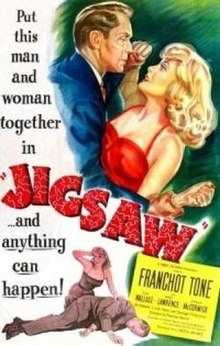This is an old revision of this page, as edited by Nuturi (talk | contribs) at 02:50, 4 June 2023 (→External links). The present address (URL) is a permanent link to this revision, which may differ significantly from the current revision.
Revision as of 02:50, 4 June 2023 by Nuturi (talk | contribs) (→External links)(diff) ← Previous revision | Latest revision (diff) | Newer revision → (diff) 1949 film noir by Fletcher Markle| Jigsaw | |
|---|---|
 Theatrical release poster Theatrical release poster | |
| Directed by | Fletcher Markle |
| Screenplay by | Fletcher Markle Vincent McConnor |
| Story by | John Roeburt |
| Produced by | Edward J. Danziger Harry Lee Danziger |
| Starring | Franchot Tone Jean Wallace Marc Lawrence |
| Cinematography | Don Malkames |
| Edited by | Robert Matthews |
| Music by | Robert W. Stringer |
| Production company | Tower Pictures |
| Distributed by | United Artists |
| Release dates |
|
| Running time | 72 minutes |
| Country | United States |
| Language | English |
| Budget | $400,000 |
Jigsaw is a 1949 American film noir crime drama directed by Fletcher Markle starring Franchot Tone, Jean Wallace and Marc Lawrence. The feature was produced by the Danziger Brothers, Edward J. Danziger and Harry Lee Danziger, from a screenplay by Vincent McConnor and Fletcher Markle, based on a story by John Roeburt.
Of note is that the film has cameo appearances by Marlene Dietrich, Henry Fonda, John Garfield, Burgess Meredith, Marsha Hunt, Doe Avedon, Everett Sloane, newspaper columnist Leonard Lyons, and the director Fletcher Markle.
Plot
The title refers to a jigsaw puzzle and the story begins with the murder of a print shop owner that is quickly labeled a suicide. But newspaper columnist Charlie Riggs is convinced that it was a murder related to a white neo-fascist organization called the Crusaders and imparts this suspicion to Assistant District Attorney Howard Malloy. He also publishes this opinion in his column. Then Riggs himself is murdered, inducing Malloy to launch an investigation into the Crusaders. Because the group appears to be getting backing from organized crime, Malloy looks there, soon receiving unsolicited help from a crime boss called Angel, who recommends him for the position of special prosecutor.
Later, with further help from a prominent judge's widow, Malloy is appointed. This is supposed to put him in the pocket of those behind the murders. But Malloy proceeds to investigate the artist who created the Crusaders recruiting poster. Seeing in the artist's studio a painting of an attractive night club singer, Malloy then proceeds to investigate her. This leads to a series of revelations regarding all of these characters and ends with more people dead and wounded in a fiery exchange at the end.
Cast
|
|
Reception
Critical response
When the film was released, The New York Times film critic, Bosley Crowther, panned the film, writing, "On the sole account of Jigsaw, which opened at the Mayfair on Saturday, Hollywood has no reason to look immediately and anxiously to its laurels ... It is sluggishly directed by Fletcher Markle, who also co-authored the script, and almost indifferently played, where good playing would do the most for it, by Franchot Tone in the principal role ... An irresistible temptation to get a few recognizable stars to play bit roles in the picture was accepted unfortunately. John Garfield is seen as a loafer, Henry Fonda as a waiter in a club, Burgess Meredith as a bartender, Marcia Hunt as a secretary and such. This tomfooling doesn't help the picture. It gives the whole thing a faintly prankish look."
References
- Variety February 1949
- Jigsaw at IMDb.
- Crowther, Bosley. The New York Times, film review, May 30, 1949. Accessed: July 12, 2013.
External links
- Jigsaw at IMDb
- Template:Allmovie title
- Jigsaw at the TCM Movie Database
- Jigsaw is available for free viewing and download at the Internet Archive
- Jigsaw informational site and DVD review at DVD Beaver (includes images)
- Jigsaw complete film on YouTube